Geekscape After Dark presents Color Blind!
Welcome to Geekscape After Dark. Racism is bad. (SPOILER ALERT!) There… Now you don’t have to see Crash. (END SPOILERS.) Instead, allow me to recommend a film that portrays a truly penetrating look at prejudice, one that dares burrow deep inside the dark gaping holes in all of us to uncover that universal truth: That underneath our clothes, we are all beautiful creatures who should spend our time loving each other. The film, of course, is Adam & Eve’s Color Blind, directed by AVN Award-nominee Nick Orleans (Naughty Co-Ed Caper, Tailgunners), and it is a brilliantly conceived film about a racist who loses his vision… only to gain a lack of racism.
Steven St. Croix (Rawhide, Any Dorm in a Storm) stars at Trent Grossman, a cleverly fitting name since, because of his racism, he is gross… man. Yes, despite his enormous success at “a multi-million dollar company,” Trent still suffers from racism which, given his networking-heavy occupation, would seem to qualify as a disability. It’s inspirational, really. Trent must have to work three times as hard as any of his peers just to compensate for his poor office politics. When he discovers that his assistant Jimmy (Ian Daniels – The Slutty Professor, Breastman Does the Twin Towers) is dating Trent’s secretary (Gina Ryder – Sensually Haunted, The Sopornos 7), a self-professed Latino, his words are strong: “People like that, they lie, cheat or are deceitful. You get them pregnant – ‘knocked up’ – they stay home, they spit out kids and collect welfare.” Despite the obvious strength of conviction in Trent’s voice, Jimmy ignores his friend’s warnings, earning him a sexual escapade with not just Trent’s secretary but also a European co-worker played by Nikita Denise (La Femme Nikita Denise 1 & 2), who happens to be European. In this way we as an audience see not just the moral advantages to racial tolerance, but the practical advantages as well!
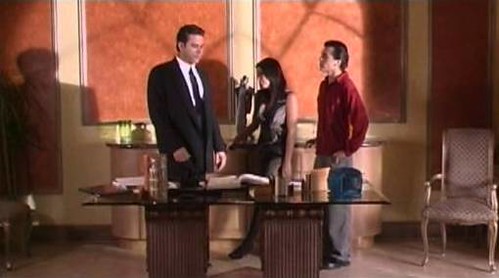
If you pay close attention to the shadows behind Trent’s desk, you will see that
they place Trent in the center of a spiderweb of his own devising, spun from his own racism.
(Or at least, they would if he had a chair.)
When Jimmy tells Trent of his recent exploits, Trent’s reaction once again confirms his racism. “I want you to go home, I want you to take a shower – actually, I want you to take two showers – then I want you to clean your **** with hydrogen peroxide, have some hot milk, and then get into bed between clean white sheets. I don’t want to have to worry about you.” But really, it’s the audience who is worrying about Trent: How can a man this dedicated to his racism possibly learn a valuable lesson about tolerance? It’s a seemingly impossible plotline to concoct, but by God, the makers of Color Blind did it: Trent the Racist goes blind after a car accident, which in turn was caused by racism (he was yelling epithets while driving and talking on a cellular phone). You see, Trent judges people based on the color of their skin, but when he goes blind he will be unable to distinguish one race from another! For marketing purposes it might have been nice if he simply went Color Blind (you know, like the title), but as Geekscape After Dark has illustrated time and again, in pornography the story always comes first. His struggle is much more cinematic if he has to relearn how to live, rather than learn how to distinguish between shades of grey.
Trent’s journey of self-discovery begins when, while lying comatose in his hospital bed, he becomes a victim of racism: Racism towards Racists. A doctor played by Mr. Marcus (Othello: Dangerous Desire, Pornocide), who happens to be black, even says, “He’s one of those. You’d hope the world would be more advanced.” Ouch. The dehumanization continues when he proceeds to have interracial sex with a fellow doctor, who happens to be white, played by Caroline Pierce (Bullets & Burlesque, Fashionistas Savado: The Challenge) right in Trent’s room! Trent would almost certainly not approve of this beautiful symbol of love without boundaries, but he’s too busy complaining that, if he’s in heaven, it should be whiter (what with the clouds, and such). When the bandages are removed, Trent discovers that he is in fact completely blind and begins screaming requests for his sight to return. Requests… which go unheeded.
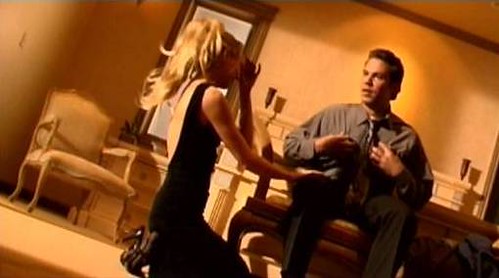
Trent Grossman’s life may not have been “turned upside down,” but it sure is canted.
At this point the film segues into Trent’s home life with his wife Christina (Jasmin Klein – Midnight Librarians, Cleopatra Does Hollywood), which is on the rocks. As if Trent’s new disability wasn’t enough, he now has to deal with his wife’s incessant faux pas, like “You should see yourself” and “You can watch if you’d like.” After pleading with Trent to get help, he finally takes a long think while standing on the precipice of the most photogenic, thoughtful landmark available – the swimming pool – and tells Christina, “Move on with your life.” She accepts his offer and agrees to a divorce, but not before fooling around with her lawyer Mr. Breckenridge (Dillon Day – Amish Daughters, Shakespeare Revealed) right in front of her husband’s back. Although she doesn’t want to “castigate” him, Christina has obviously lost her feelings for Trent. Clever viewers could tell from her very first scene, in which a close-up clearly designed to symbolize their marriage reveals that she wears her wedding ring on the wrong finger.
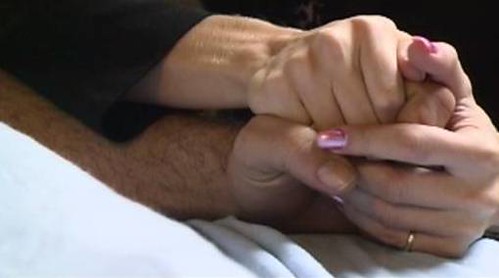
A ring on her little finger implies that Christina is not actually married, but rather that
she belongs to “The Order of the Engineer.”
Jimmy arrives to read Trent the divorce papers and to cheer his doubly troubled friend up by getting together with some girls and having a party, but Trent refuses on the off-chance that Jimmy would bring some of his minority friends. Jimmy tries to express the irony of a blind man judging people based on how they look, but Trent just blows him off, saying, “You watch way too much TV, college boy.” The irony of his statement speaks volumes: accusing Jimmy of watching way too much television implies his lack of education, an insult which is immediately contradicted by calling him “college boy,” which frequently implies an abundance thereof. Trent’s opinions are hereby illustrated as being illogical. He still has room to grow. At least, a part of him does.

Don’t do it, Trent! You’ll ruin your sweater!
The growing part of the movie begins in earnest when Christina requires that he seek professional assistance in the divorce proceedings… an unusual request, to be certain, but apparently you can do that. Trent acquiesces and two beautiful tutors arrive at Trent’s house silhouetted by the most powerful lens flare ever filmed (until J. J. Abram’s Star Trek, of course – Abrams obviously saw and was inspired by Color Blind to make his film about a future where all races exist in harmony, and it’s time to give credit where credit is due). It’s a clever, possibly even fantastically ingenious way of disguising the fact that neither character is white until just the right moment in the narrative – i.e. the next shot. But establishing shots are lost on the blind, and Trent mistakes both Ashley Smith (Mia Smiles – Mobster’s Ball, Terms of Enslavement), who happens to be of Korean descent, and Karen Lockwood (Dee – Dee Licious, I Know Who You Did Last Summer), who happens to be of Latino descent, for white people, doubtless based on their vaguely misleading names.

Proof that J.J. Abrams watches pornography? We think so.
Ashley and Karen begin instructing Trent on how to read Braille, walk with a cane and do basic household chores which he probably took for granted or something. Steven St. Croix’s heretofore perpetually aggravated performance takes a subtle turn here towards charming goofiness, and comparing this delightful sequence in the film to the more subtle works of Will Ferrell would not be inappropriate. (It’s fun to imagine Ferrell’s character from Melinda & Melinda playing Trent with a limp.) Though they clearly care for Trent as a human being, they are also both human themselves and eventually decide to amuse themselves by going about their days in various states of undress, and even teasing each other with lewd acts while Trent is in the room. Once again Trent is dehumanized, although this time it’s not for his beliefs but rather his disability. Again, ouch. Like Crash, which brilliantly showed that every race conforms to every negative stereotype imaginable even when they claim not to, these moments are masterpieces of irony. Finally their games blossom into a three-way love affair that culminates when Trent asks them – both of them – to marry him. Ashley and Karen are so touched and in love that they both agree immediately without even considering the legal or even social implications of polygamy in America. Perhaps Color Blind was an early inspiration for Big Love?
Before the marriage, there’s something Ashley and Karen need to mention: their associate Lena Fields (Flick Shagwell – Being Porn Again, From Lust Till Dawn) has developed a new treatment that gives the blind their sight back… for 2-3 minutes… and which then causes them to go blind permanently. (My research was limited but for all the blind people reading this article, be aware that this process is expensive, and possibly even fictitious, so ask your doctor.) Trent jumps at the chance to actually see his brides before the wedding, so they hook him up to a contraption that looks like a combination of the Weapon X project and a Maxell commercial. As his vision slowly returns, he sees that the two women he fell in love with so much that he couldn’t marry just one are actually… people that he hates?!
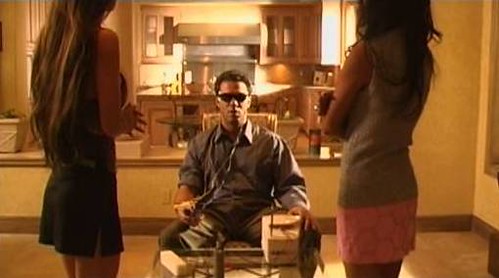
They unblinded him with science!
Karen and Ashley are both very confused by his behavior and deeply hurt by his accusations of deceitfulness, which is ironic since the whole “walking around naked because he can’t see us because it’s fun” subplot does seem disingenuous at best. But Trent orders them to leave his house and spends his last minute of sight staring out at his property. Earlier in the film, Trent said that his house “represents everything that I worked for my entire life,” subtly implying that his house actually represents what he worked for his entire life. But now what he worked for his entire life is empty, and that’s the last thing he will ever see. Frankly, if you’re not crying by the end of Color Blind then you are less than a human being… and I hate you.
Practically dripping with regret, Trent makes a painful and desperate awkward walk down a hallway in a bravura sequence (detailed below) in which he makes not one but three slow-motion pratfalls down the hallway. Ordinarily this sequence would be hilarious, but in the proper context (he’s unhappy/a racist) it’s a devastating scene that doles out enough punishment on our protagonist to make even that heartless foreigner Lars Von Trier squirm. Trent falls, and apparently can’t get up until that evening when Ashley and Karen return. They’re angry, but still responsible for Trent’s well-being. Trent actually apologizes with a heartfelt “I’m sorry.” (Astute viewers can probably sense a sequel in his phrasing… he’s sorry for what exactly?) Ashley and Karen immediately accept his apology and his love, over and over again, all night long. With sex. The End.


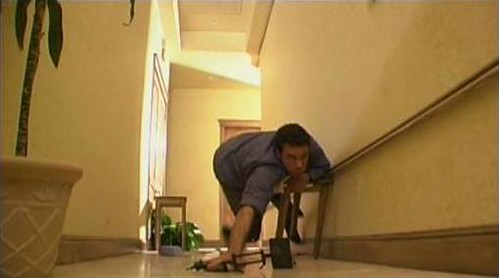


Porn star Steven St. Croix is renowned for his extremely physical performances.
Pornography is often viewed by negatively by audiences sight unseen (ironically) because it is viewed as an artistically inert genre that has little to contribute to society, but these people by definition have not seen Color Blind, and as such they’re missing out on an exceptional piece of filmmaking. This film about blindness, for example, opens and closes with a close-up of an eye, which most storytellers would probably not have thought about. Next, we see that same close-up in black and white photography, followed by negative black and white photography, followed by color negative photography. You see, these transitions imply that the owner of that eye will have their perceptions altered three times throughout the film, from racist, to blind and racist, to temporarily not-blind and learning a valuable lesson, and then back to blind, only now less racist, and all in one shot!
Color Blind is an exceptional film with an exceptional moral: that racism is bad because it cuts down on potential sexual conquests. In contrast, Paul Haggis spent so much time in Crash focusing on the first half of that message that he completely ignored the second, which is a shame (I can only imagine how many Oscars he would have won). You’ll laugh (at blindness), you’ll cry (at blindness), and you may even become aroused (despite blindness) at Color Blind, available now from Adam & Eve.
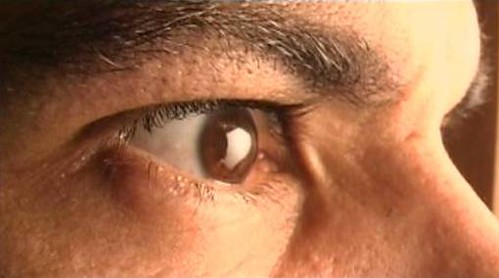
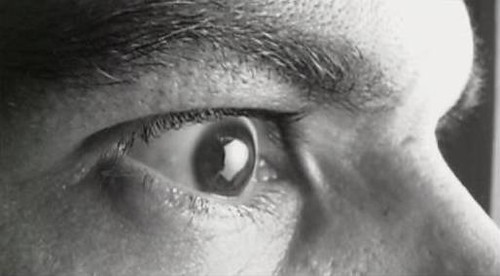

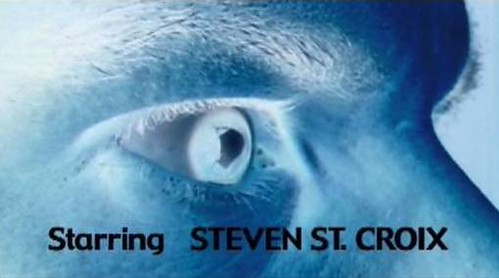
Color Blind is full of brilliant sequences that film aficionados will drool over.
